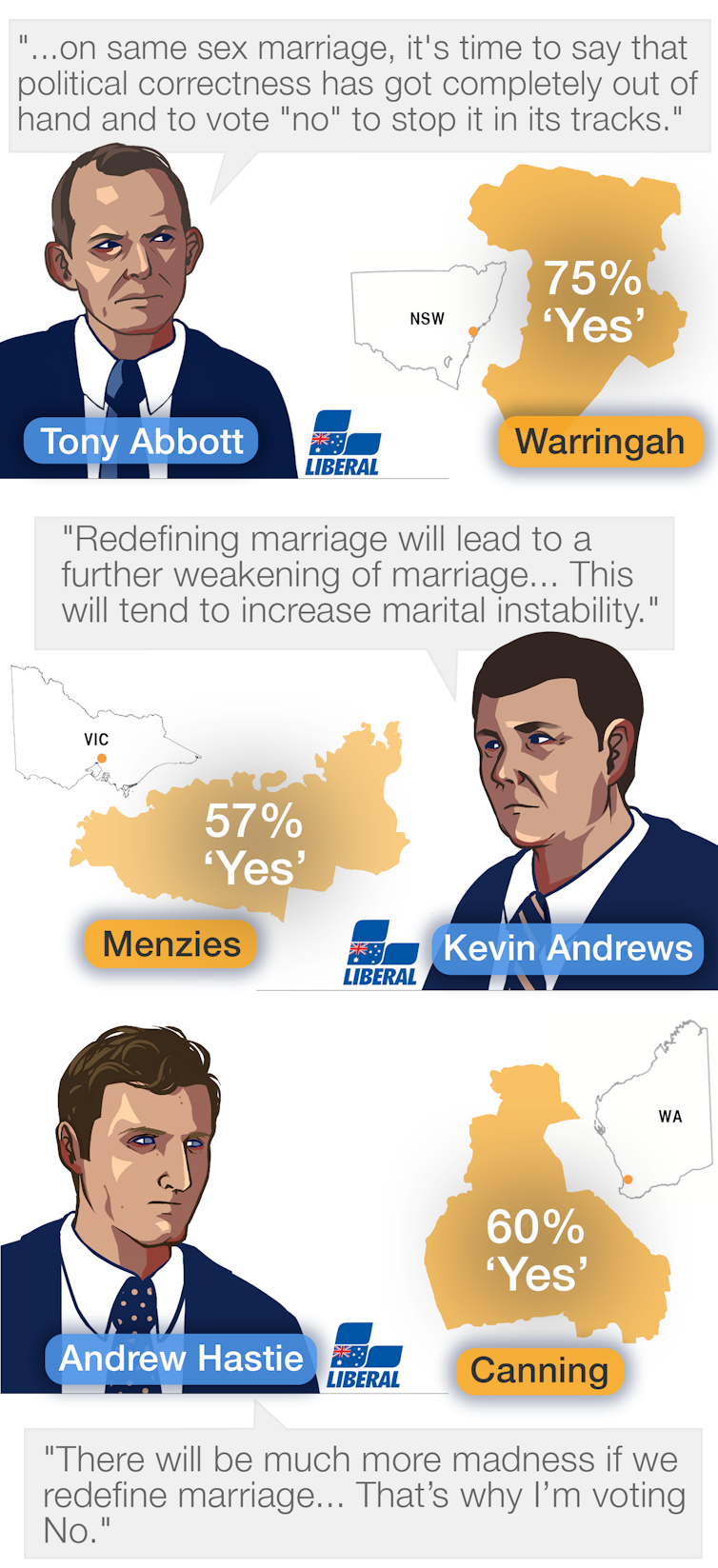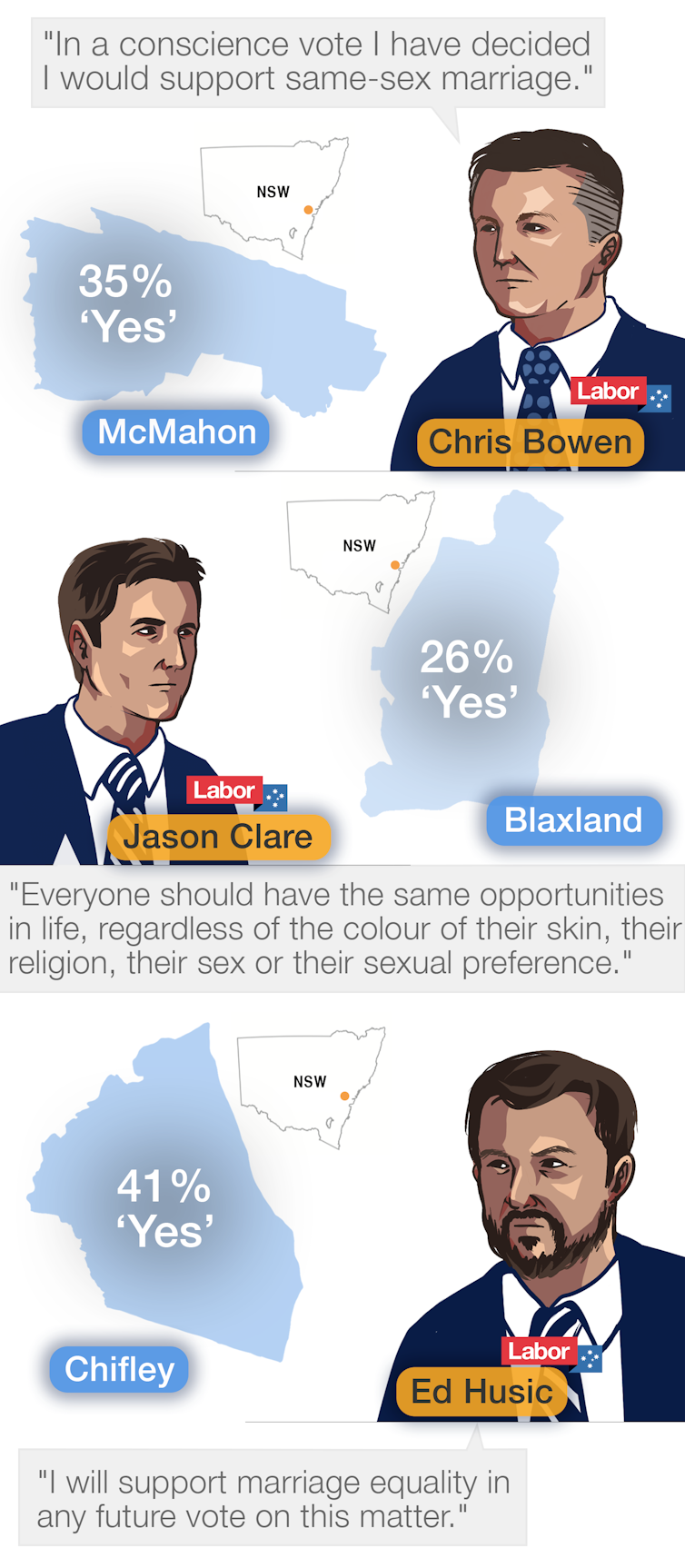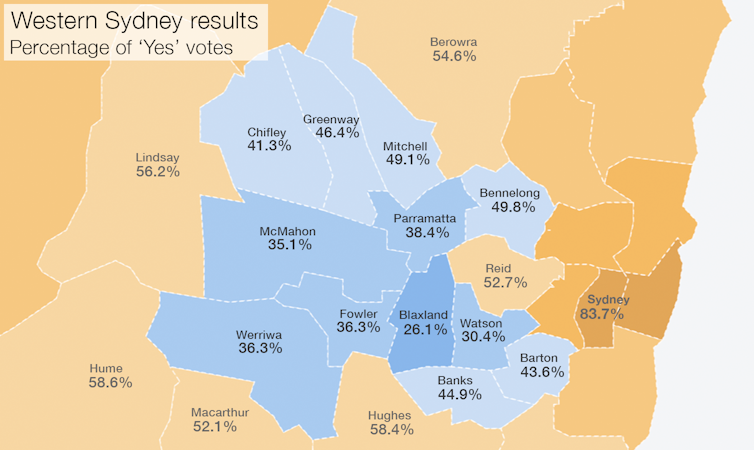Same-sex marriage result delivers much-needed good news for embattled Turnbull
- Written by Michelle Grattan, Professorial Fellow, University of Canberra
Australians have paved the way for the country’s biggest legislative social change in decades.
But before we congratulate ourselves excessively, let’s remember that legalising marriage equality just catches us up with many comparable countries. It is extraordinary that this country has lagged behind New Zealand and Britain, where reform came years ago under conservative governments.
Politically, this is a win for Malcolm Turnbull, giving him some good news in the generally bleak scene that surrounds his government.
But the real victory belongs to the five Liberals (four of them gay) who forced the issue back onto the political agenda – Dean Smith, Trent Zimmerman, Trevor Evans, Warren Entsch, and Tim Wilson.
Without them, working with the marriage equality lobby, it would not have been brought back on the agenda this year. Their boldness was a risky exercise, not least for Turnbull, but it has paid off.
Labor, Greens, and the LGBTI community opposed the popular vote, wanting the issue settled by parliament alone. But the voluntary postal ballot has delivered a decisive result, giving the reform maximum moral legitimacy.
 Marcella Cheng for The Conversation, CC BY-ND
The high participation rate – nearly 80% – showed that the public – generally disillusioned with politicians – liked having their say.
It was an exercise in direct democracy – a theoretically attractive system that nevertheless carries dangers. Politicians would not want to use it on more than rare occasions.
The campaign undoubtedly caused some pain and angst to LGBTI people, and was marked by a few bad incidents that highlighted the nastier, more intolerant side of our politics.
But the negatives can be exaggerated. The result affirmed the tolerant, inclusive nature of Australia.
Marcella Cheng for The Conversation, CC BY-ND
The high participation rate – nearly 80% – showed that the public – generally disillusioned with politicians – liked having their say.
It was an exercise in direct democracy – a theoretically attractive system that nevertheless carries dangers. Politicians would not want to use it on more than rare occasions.
The campaign undoubtedly caused some pain and angst to LGBTI people, and was marked by a few bad incidents that highlighted the nastier, more intolerant side of our politics.
But the negatives can be exaggerated. The result affirmed the tolerant, inclusive nature of Australia.
 Marcella Cheng for The Conversation, CC BY-ND
This was emphasised by the uniformity of the “yes” vote across the country. Only 17 out of 150 electorates voted “no”; in three states – Western Australia, South Australia and Tasmania – all electorates voted “yes”.
One significant feature, however, was the strength of the “no” vote in western Sydney, reflecting the ethnic composition of that area.
Nine of the dozen NSW seats voting no are held by Labor, meaning a number of ALP MPs will be voting against the views of their constituents.
Interestingly, the seat of Bennelong, where there’s now a byelection underway, turned in a lineball “no” – the area saw a big “no” campaign in the large Chinese community.
Marcella Cheng for The Conversation, CC BY-ND
This was emphasised by the uniformity of the “yes” vote across the country. Only 17 out of 150 electorates voted “no”; in three states – Western Australia, South Australia and Tasmania – all electorates voted “yes”.
One significant feature, however, was the strength of the “no” vote in western Sydney, reflecting the ethnic composition of that area.
Nine of the dozen NSW seats voting no are held by Labor, meaning a number of ALP MPs will be voting against the views of their constituents.
Interestingly, the seat of Bennelong, where there’s now a byelection underway, turned in a lineball “no” – the area saw a big “no” campaign in the large Chinese community.
 The Conversation / ABS data, CC BY-ND
The battle in the coming few weeks will be over the nature of the private member’s bill to implement the change.
This comes down to a fight between those who want to enshrine reasonable religious protections, and the conservatives who are demanding sweeping exemptions on conscientious as well as religious grounds for cake makers, florists, venues and the like, providing services for weddings.
The conservatives also want parents to be allowed to pull their children out of classes if they object to teachings around marriage and gender.
Turnbull has thrown his weight behind the moderate cross-party private member’s bill that originated with Smith, on which debate is due to start in the Senate on Thursday.
Conservatives on Wednesday were trying to delay the timetable – although BuzzFeed reported that Tony Abbott has told his sister, prominent “yes” campaigner Christine Forster, he agreed with her that legislation should be moved through parliament pretty quickly.
The Law Council of Australia warned against the conservative push, which has been embodied in a bill promoted by Victorian Liberal senator James Paterson.
The council said: “Australians have voted for marriage equality, they have not voted to erode anti-discrimination protections”, adding the Smith bill offered a reasonable compromise and fair balance of rights.
Those conservatives who are digging in over the form of the legislation are driven by two motives – their beliefs but also their hostility to Turnbull.
Turnbull – as he appears set to do – needs to continue to stare them down because what they are demanding is prejudiced and discriminatory. In this he would surely have the support of most Australians, who would want religious protections but not new discrimination, and would take a commonsense view.
Given the support of a majority in Labor, the cross-party bill almost certainly has the parliamentary numbers to pass, although there may be amendments at the edges.
Turnbull’s comments after the result indicate he is also determined to deliver the legislation on time – that is, before Christmas.
Whether the conservatives will visit some sort of retribution on Turnbull later remains to be seen. They are a politically hard-eyed, unforgiving lot.
The Conversation / ABS data, CC BY-ND
The battle in the coming few weeks will be over the nature of the private member’s bill to implement the change.
This comes down to a fight between those who want to enshrine reasonable religious protections, and the conservatives who are demanding sweeping exemptions on conscientious as well as religious grounds for cake makers, florists, venues and the like, providing services for weddings.
The conservatives also want parents to be allowed to pull their children out of classes if they object to teachings around marriage and gender.
Turnbull has thrown his weight behind the moderate cross-party private member’s bill that originated with Smith, on which debate is due to start in the Senate on Thursday.
Conservatives on Wednesday were trying to delay the timetable – although BuzzFeed reported that Tony Abbott has told his sister, prominent “yes” campaigner Christine Forster, he agreed with her that legislation should be moved through parliament pretty quickly.
The Law Council of Australia warned against the conservative push, which has been embodied in a bill promoted by Victorian Liberal senator James Paterson.
The council said: “Australians have voted for marriage equality, they have not voted to erode anti-discrimination protections”, adding the Smith bill offered a reasonable compromise and fair balance of rights.
Those conservatives who are digging in over the form of the legislation are driven by two motives – their beliefs but also their hostility to Turnbull.
Turnbull – as he appears set to do – needs to continue to stare them down because what they are demanding is prejudiced and discriminatory. In this he would surely have the support of most Australians, who would want religious protections but not new discrimination, and would take a commonsense view.
Given the support of a majority in Labor, the cross-party bill almost certainly has the parliamentary numbers to pass, although there may be amendments at the edges.
Turnbull’s comments after the result indicate he is also determined to deliver the legislation on time – that is, before Christmas.
Whether the conservatives will visit some sort of retribution on Turnbull later remains to be seen. They are a politically hard-eyed, unforgiving lot.
Authors: Michelle Grattan, Professorial Fellow, University of Canberra





